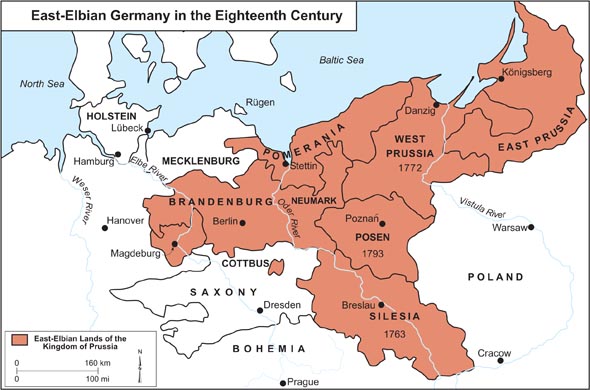The
region of Prussia includes much of what is today now included in North-Eastern Germany, Poland and Russia . It
would from the time of the late 17th century develop into the most
powerful of all the German states and eventually would become the center point
for German unification. Historically the name, Prussia goes back to the 13th
century and the old Order of Teutonic Knights. The old Duchy of Prussia was
born in 1525 and in 1701 the Duchy of Prussia joined with Brandenburg to form
the Kingdom of Prussia. The Prussian capital was located in Berlin.

Prussia in a German Context Source: GHDI-Map
A key
figure in early modern Prussian history was the Elector of Brandenburg and Duke of Prussia Frederick Wilhelm known also as the Great Elector. It was
Frederick Wilhelm, a member of the
Hohenzollern family, who strengthened Prussia’s position in the
region setting in motion the eventual elevation of Prussia from a duchy to a
kingdom. As a monarch Frederick Wilhem also opened up
Brandenburg-Prussia (via the Edict of Potsdam)
to settlement by French Huguenots escaping persecution in Louis XIV’s
France.
Frederick Wilhelm - Elector of Brandenburg source: wikipedia
The
first king of the Prussian kingdom was Frederick I, the son of Frederick Wilhelm. He would rule from 1701-1713 and was
succeeded by his son, Frederick Wilhelm I (yes another one) who would become
known as the soldier king. The new king
would reign as an absolute monarch restructuring the state along lines that
were dominated by a powerful military. The Prussian bureaucracy as a mechanism
of state authority was a growing feature of
Frederick Wilhem I’s rule.
Frederick Wilhelm I - source: Britannica
Frederick
II, later known as the Frederick the Great, succeeded his father in 1740.
Although he continued his father’s military tradition by involving Prussia in
the War of the Austrian succession (which allowed Prussia to take control of
Silesia) and then later the Seven Years War (where Prussia again expanded its
territory), Frederick II is considered to be one of the Enlightenment monarchs.
His forward
thinking absolutist court abolished torture, reformed the civil code, advanced
secondary education and restricted crown involvement in matters of justice. He
also encouraged an exchange of ideas
with the philosopher Voltaire enjoying time at the court. He described it as
‘Sparta in the morning and Athens in the afternoon’.
Frederick the Great source: history.com
Frederick
II passed away in 1786 leaving Prussia, especially after the First Partition of
Poland in 1772, as a continental power. A century later Bismarck would build on
this to complete the unification of Germany.
No comments:
Post a Comment